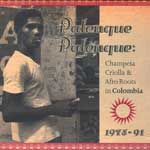With this as preamble, it makes sense that recent generations of afro-Colombians would have a natural attraction to African popular music. It’s the degree and intensity of that attraction that is so striking. From the moment that Cartegena’s purveyors of early soundsystems—picos, as in pickup trucks tricked out with sound gear—got their hands on African records in the late 50s and 60s, Afropop sound hunting became a fanatical pursuit. By the ‘80s, vinyl LPs of highlife, afrobeat, Congo music, Haitian compass, even South African mbaqanga—generally with the labels scratched off to protect trade secrets—were prized possessions among local DJs. And of course, local musicians took notice, resulting in unusual fusions of traditional music and African pop, the start of the sound called champeta (big knife) criolla.
We get 21 short selections of this quirky, exuberant music on this compilation. Abelardo Carbonó’s clean, ringing guitar intro on “Palenque” and the pumping bass line that follows would be right at home in a Congolese pop song, but the hand percussion and rustic, Spanish vocals add a completely different dimension to the mix. Fela’s afrobeat echoes through many of these tracks, including Wganda Kenya’s organ-driven “Pim Pom” with its echoey, growling lead vocal, and the sizzling, brassy “El Sucusu” by La Nelda Pina. Two other tracks are directly inspired by Fela’s “Shakara,” which achieved anthem-like status in Cartegena in 1972. Lisandro Mezas folksy cover of the song, called “Shacalao,” is particularly delicious.
The sensuous lope of cumbia also animates many of these selections, from the twangy guitar and cowbell-driven “Esclavo Moderno” by Manuel Alvarez, to Cumbia Siglo XX’s “Naga Pegale,” which opens with a rap fast enough to be an auction call. What hits you again and again is the playful originality of these songs. Low, repeating horn ostinatos recall the vaksin of Haitian rara. On La Soneros de Gamero’s “Katunga” a rollicking collision of brass lines over the top of such a part evokes the spirit of Dixieland. A treasure among treasures, “Quiero a Mi Gente” by Abelardo Carbonó, unfolds as a skittering, bustling blend of percussion and strings with a dreamy high vocal with a wild slide guitar solo.
In the 90s, such charmed and charming experiments were sidelined by a more robust modern wave of champeta criolla. As everywhere, for the locals, time marches on. But this compilation offers a window into yet another rich era of chance-taking and eccentricity, the birth of a new music that for all its many borrowings, could not have occurred anywhere else but on Colombia’s Pacific coast.
-Banning Eyre









